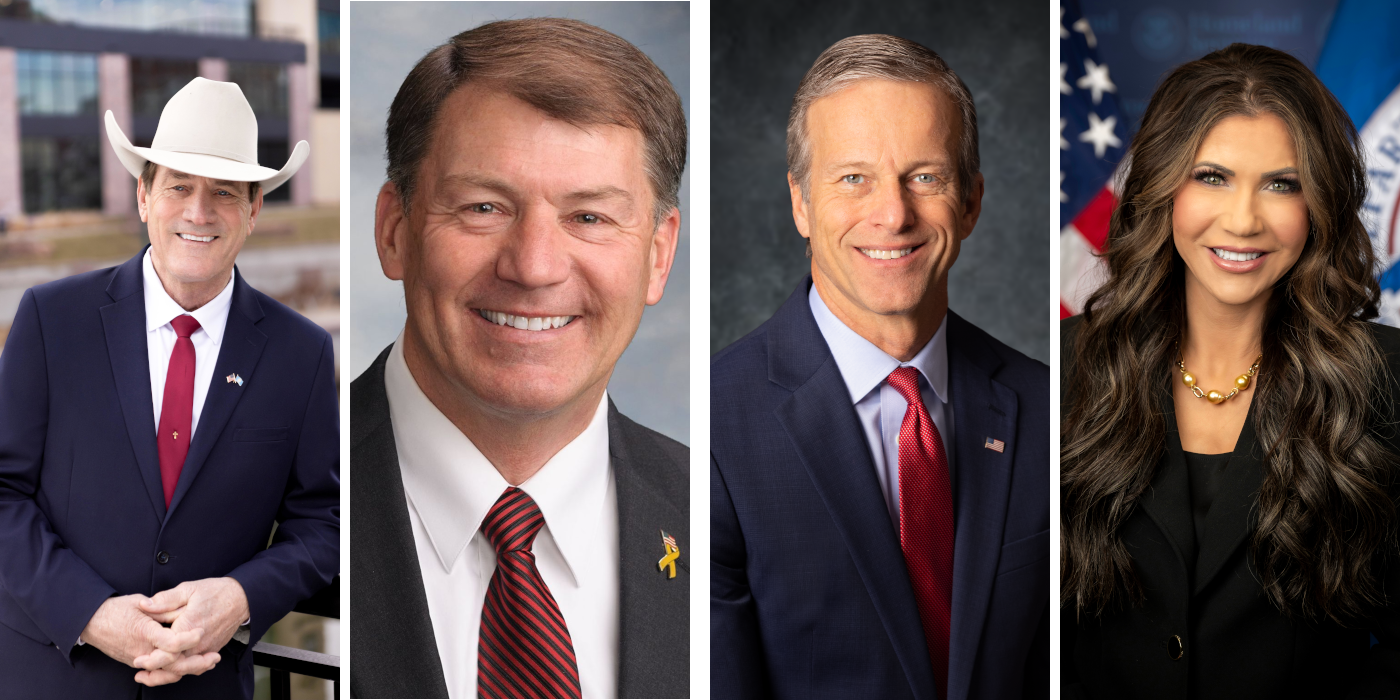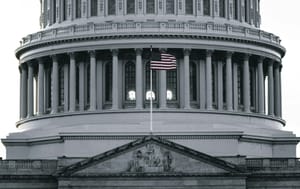PIERRE, S.D. – South Dakota's most prominent political leaders generally maintain high approval ratings among registered voters, according to a scientific poll co-sponsored by South Dakota News Watch.
However, Kristi Noem, former governor and current secretary of Homeland Security, has seen declines from a poll six months ago and Sen. John Thune's ratings appear somewhat low for a senator of a deeply red state. These numbers may reflect the challenges of balancing state interests and national priorities, analysts said.

This latest statewide survey, co-sponsored by the Chiesman Center for Democracy at the University of South Dakota queried people about:
- Favorability and name recognition of U.S. House and governor candidates among Republican voters
- All voters' position on Thune’s job performance as Senate majority leader and his commitment to South Dakota as senator
- All voters' view of the job performance of Gov. Larry Rhoden, U.S. Sen. Mike Rounds and Noem.
Mason-Dixon Polling and Strategy, ranked as one of the least-biased and most-factual pollsters, conducted the poll of 500 registered voters from all parties Oct. 16-19 and 502 Republican voters Oct. 16-20 using random selections from a telephone-matched state voter registration list that included both landline and cellphone numbers from across the state. Quotas were assigned to reflect voter registration by county. The margin for error is no more than plus or minus 4.5 percentage points.
Here are the results of that survey.
House and governor GOP candidates
There are currently four candidates in the race for governor: Aberdeen businessman Toby Doeden, state Rep. Jon Hansen, U.S. Rep. Dusty Johnson and Rhoden.
There are currently three candidates for U.S. House: Piedmont businessman James Bialota, state Sen. Casey Crabtree and Attorney General Marty Jackley.
Johnson saw a drop of 5 percentage points in his favorable rating among Republican voters from the poll last spring while Rhoden's remained unchanged. In that time, Doeden saw his favorable ratings increase 10 percentage points. Hansen struggles with name recognition in the race for governor.
In the U.S. House race, Jackley's favorable rating fell 6 percentage points, but he remains well above his challengers, Crabtree and Biolata, who weren't polled in April as they hadn't entered the race at that point.
Takeaway: Johnson name recognition
Julia Hellwege, director of the Chiesman Center and USD associate professor in political science, said that Johnson’s lead in favorability over Rhoden may stem from Rhoden having a higher number of Republicans who don't recognize his name. Rhoden’s name wasn’t recognized by 14% of Republicans, and Johnson wasn’t recognized by 2%.
That’s compared to Doeden who wasn’t recognized by 30% of Republicans and Bialota who wasn’t recognized by 81% of Republicans. In April, 58% of Republicans didn't recognize Doeden's name.
There was a much higher level of neutral feelings toward Rhoden than Johnson, which may be due to the difference in their offices, Hellwege said.
“Congress tends to be more visible and polarizing than the governor. Dusty’s favorability is higher than Rhoden, but compared to April, his favorability rating is somewhat lower. In part, it may stem from a higher name recognition at this time,” she said.
Hansen, Crabtree and Bialota have low name recognition, making it difficult to consider their favorability ratings among Republican voters, she said.
Sen. Thune's approval rating
Registered voters were also asked about their position on Thune’s job performance as Senate majority leader as well as his level of commitment to South Dakota. The senator maintains a high approval rating, and a majority believe he’s committed to South Dakota.
Takeaway: No change since April
Thune’s ratings haven’t changed since the April poll. He officially became majority leader in January when the new Congress convened.
Brad Coker, founder of Mason-Dixon Strategy and Polling, said that, while 54% of voters approve of Thune’s performance as majority leader, South Dakota is a deeply red state, where you’d expect the number to be higher.
“If I saw these approval numbers for a congressional leader in a swing state, such as Arizona, they would be considered average in the current polarized environment,” Coker said.
Takeaway: Daschle parallels
Thune’s approval ratings may be lower than they might otherwise be for the same reasons his predecessor’s approval declined, said Michael Card, emeritus professor of political science at the University of South Dakota.
Tom Daschle served in the U.S. Senate from 1987 until 2005.
Mason-Dixon polling from the 2004 Senate race showed Daschle with a 54% favorable rating among voters, but that declined to 49% in October 2004, just before the election. Daschle had tried to balance the national Democratic agenda with the interests of Republicans in South Dakota, but voters ultimately saw Republican Thune as the better choice in 2004.
Card said Thune may run into the same trouble. In the midst of the federal government shutdown and trying to hold the Democratic party responsible for it, Senate Republicans have to keep holding votes.
“Sen. Thune has spent much of the month of October in Washington,” Card said.
Daschle had made a big deal of going to all 66 counties in the state, but when he became majority leader in 2001, he couldn’t pull off that kind of schedule, Card said.
Thune may not be seeing declining approval ratings as Daschle did in the months leading up to the 2004 election due to the current political climate of South Dakota, he said.
Republicans are particularly popular, and the Democratic Party is more unpopular than it was in Daschle’s time. Were Thune in the same political climate today as Daschle was in 2004, his approval rating might be lower. So any impacts to his favorability stemming from his association with D.C. may be masked by the fact South Dakota is redder than it was in Daschle's time, Card said.
Coker said that Thune isn't politically vulnerable right now. Republicans were on the rise when Daschle's ratings fell, and the current Democratic Party doesn't appear to be organizationally capable of defeating Thune.
Rhoden, Rounds and Noem job performance
Voters of all parties also weighed in on the job performance of Rhoden, Rounds and Noem.
Rhoden maintains a high approval rating among voters with 58%, as does Rounds (52%), according to the poll. Noem saw a slight decline in her approval rating among registered voters from a poll News Watch and its partners conducted last April but was still 47%.
Takeaway: Noem's decline
In April, 51% of registered voters approved of Noem’s job performance as head of the Department of Homeland Security, and the latest poll shows it’s fallen 4 percentage points.
Hellwege said it’s not a substantial drop, but the decline is there.
“It’s difficult to disentangle, though, whether this stems from policy or her individual behavior, especially given the sheer amount of media attention. She has certainly carved out an individual persona, which is historically somewhat unusual for cabinet members, but more true of Trump’s cabinet overall,” Hellwege said.
Noem, who's from Castlewood, has become the face of immigration enforcement as the Trump administration carries out its policy of mass deportations. Her high-visibility methods have drawn as much attention as her mission, which involves running a federal network of more than 20 agencies and over 200,000 employees.
Takeaway: Partisan divide
The poll results show an expected partisan divide, with Noem having the most polarized results.
Only 2% of Democrats approved of Noem's job performance and 98% disapproved. None of those polled were neutral. Among Republicans, 71% approved of her job performance and 26% disapproved.
For Rhoden, 20% of registered Democrats approved of his job performance, and 52% had an unfavorable position. Among Republicans, Rhoden’s approval was 77%, with 11% having a negative view.
Rounds' approval among Democrats was 20%, with 75% saying they disapprove of his performance as senator. Republican voter approval for Rounds was at 68% and 27% disapproved.
Takeaway: Growing gap with Independents
In South Dakota and the nation as a whole over the past year, Independents’ positions have been similar, if not indistinguishable, from Republicans, Hellwege said. However, this latest poll shows a gap between both parties and Independents.
For Noem, 41% of registered Independents approved of her job performance and 57% disapproved. Only 2% were unsure.
The same gap is seen with Rhoden’s results, with 56% of Independents saying they approve of his job performance and 25% saying they disapprove. Another 19% were unsure.
“Independents are significantly different from either of the two parties holding a solid moderate middle ground on approval,” Hellwege said.
Biographies
- Bialota is a small-business owner, dealing in military surplus, sporting goods and precious metals. The Piedmont resident is a disabled combat veteran who served in the Air Force and is the former director of the West Dakota Water Development District.
- Crabtree was appointed to the South Dakota Senate by Noem in 2020 and was reelected in 2020, 2022 and 2024. He lives in Madison, where he is economic development director for Heartland Energy, a public power utility.
- Jackley was elected in 2022 to serve as South Dakota’s attorney general. He was U.S. attorney for South Dakota from 2006 to 2009 and previously served as state attorney general from 2009 to 2019 when term limits kept him from running again. He ran unsuccessfully for governor against Noem in 2018.
- Doeden has never run for office. He bought Aberdeen Chrysler in 2020 after working there for 23 years. He also owns a Ford dealership in Redfield as well as rental properties and retail establishments.
- Hansen served in the state House from 2011 to 2013 before resigning to attend law school. The Dell Rapids lawyer was again elected to the House in 2019 and rose to speaker this year. South Dakota limits House members to four consecutive terms, and Hansen's term ends next year.
- Johnson was elected to South Dakota’s at-large congressional district in 2018. Prior to that, the Pierre native served on the Public Utilities Commission from 2004 to 2011 and was chief of staff to former Gov. Dennis Daugaard. Upon announcing his intention to run for governor, he said he wouldn't run for reelection to the U.S. House.
- Noem was elected to be South Dakota’s 33rd governor in 2018 and was reelected to serve a second term in 2022. In January, she resigned after being confirmed as secretary of the Department of Homeland Security. She served in the South Dakota House from 2007 to 2011 and the U.S. House from 2011 to 2019.
- Rhoden became the 34th governor of South Dakota in January when Noem was appointed to lead Homeland Security. The Union Center rancher was elected to lieutenant governor in 2018 and again in 2022. He also served as South Dakota's agriculture ambassador from 2020 to 2025.
- Rounds was elected to the U.S. Senate in 2014, succeeding Sen. Tim Johnson, a Democrat who retired. He was reelected in 2020 and is running for re-election in 2026. The Pierre native served two terms as the 31st governor of South Dakota from 2003-2011. Prior to that, he served in the South Dakota Senate from 1991-2000.
- Thune was elected to the U.S. Senate in 2004 after serving in the U.S. House from 1997-2003. He grew up in Murdo and before running for office was a legislative aide to U.S. Sen. James Abdnor from 1985-1987. He also served as executive director of the South Dakota Republican Party, as state railroad director and as executive director of the South Dakota Municipal League.
Other poll results:


This story was produced by South Dakota News Watch, an independent, nonprofit organization. Read more stories and donate at sdnewswatch.org and sign up for an email to get stories when they're published. Contact statehouse investigative reporter Kevin Killough at kevin.killough@sdnewswatch.org.









